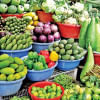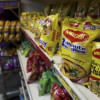Processed Food: Govt to ensure safety by 2021
The government aims to make processed food producers comply with set standards so that safe food could be ensured by 2021.
Bangladesh Food Safety Authority (BFSA) said it had taken up an initiative to get 25 lakh food business operators registered. This would allow them to be properly monitored and supervised.
The BFSA is also taking strides to ensure risk-based food inspections to guarantee food safety, from farm to fork, said its officials at the first ever Bangladesh Food Safety Conference that began at Hotel Sonargaon yesterday.
The conference is being held at a time when people are worried about food adulteration.
Inadequate internationally accredited laboratories, lack of skilled people and technicians, differences between global and domestic standards, and poor awareness among producers and consumers were major challenges for BFSA.
“We have become an example for many countries in ensuring food security. Yet, ensuring safe food remains a major challenge,” said Industries Minister Amir Hossain Amu at the inaugural ceremony.
Bangladesh Foreign Investors Chamber of Commerce and Industry (FICCI), Metropolitan Chamber of Commerce and Industry (MCCI), BFSA and Bangladesh Standards and Testing Institution (BSTI) jointly organised the two-day event with the theme “Protecting Consumers: A Shared Responsibility”.
A number of the participants yesterday raised concern over the sale of food items in unhygienic and open places and blamed the regulators for their lack of action.
“Those who have enough money can buy quality meat from different super stores. But how will people like us be sure of safe meat when we buy it from the open market,” a teacher in the audience asked the food safety regulators during a session on food safety management yesterday.
Experts from various international organisations and businesses suggested that the government frames food standards in line with the Codex Alimentarius, a series of international standards for food and agricultural products.
Amu said ensuring food safety was vital for increasing exports. He expected that the country would get $1 billion by 2021 through food exports.
At the inauguration programme, Food Minister Qamrul Islam said the government had established the BFSA to ensure safe food for all.
The BFSA began its journey in February 2015 and has been working in coordination with 18 ministries and 480 agencies, he said. It also framed four regulations.
He said, “Whenever I go abroad, I see people having street food with confidence. We want to take our country to that level."
Qamrul warned food businesses of action for food adulteration. Food court has been established in every district, he said, adding, "Beware, we have the law and can apply it anytime."
Kaikobad Hossain, secretary to the food ministry, said inspectors of the BFSA would randomly pick products from shelves to test their quality. Actions would be taken if anything beyond specification was found, he said.
BFSA Chairman Mohammad Mahfuzul Hoque said his office has prepared a five-year strategic plan. One of the goals is to ensure compliance of food industry operators, particularly makers of packaged food, and encourage them to follow best practices.
During a session, Sanjay Dave, former chairman of Codex Alimentarius Commission and former adviser to the Food Safety and Standards Authority of India (FSSAI), said Bangladesh is a member of the Codex and suggested that the government took part in Codex meetings.
He also recommended framing regulations in line with international standards. “Harmonise with Codex standards,” he said, suggesting regulations related to food recall, food fortification, additives, heavy metals and pesticides.
Carmen Savelli, of Risk Assessment and Management Unit of the department of Food Safety and Zoonoses at World Health Organisation, said worldwide, one in 10 people become sick for consuming unsafe food.
On Southeast Asian region, he said 175,000 people die every year and 150 million suffer from food-borne diseases.
“The public health apprehensions regarding food safety issues in Bangladesh have reached an alarming state,” said FICCI President Rupali Chowdhury at the inaugural ceremony.
BFSA board member Prof Iqbal Rouf Mamun said the BFSA plans to have mobile laboratories beside some wet markets of Dhaka city to test food items.
Himanshu Gupta, manager of global regulatory and scientific affairs of Nestle, said ensuring food safety is not just a legal operation, it is needed for winning consumer trust.
MCCI President Nihad Kabir and Director Scientific and Regulatory Affairs of Coca Cola Far East Ltd Ng Kim Keat also spoke among others.

 For all latest news, follow The Daily Star's Google News channel.
For all latest news, follow The Daily Star's Google News channel. 







Comments